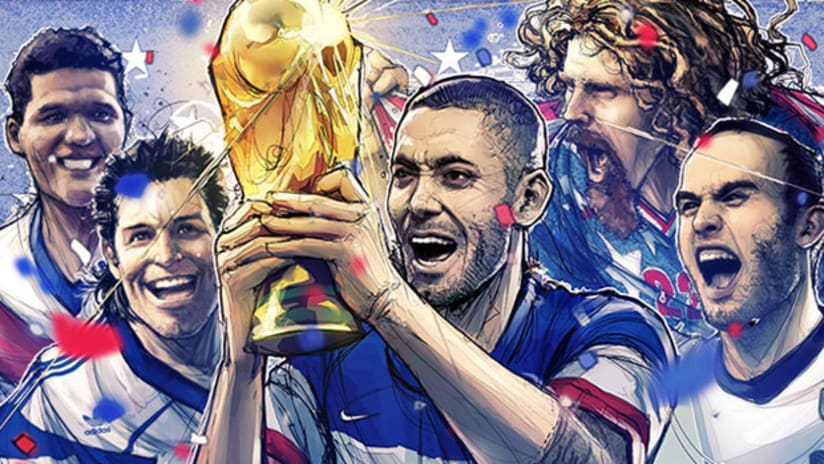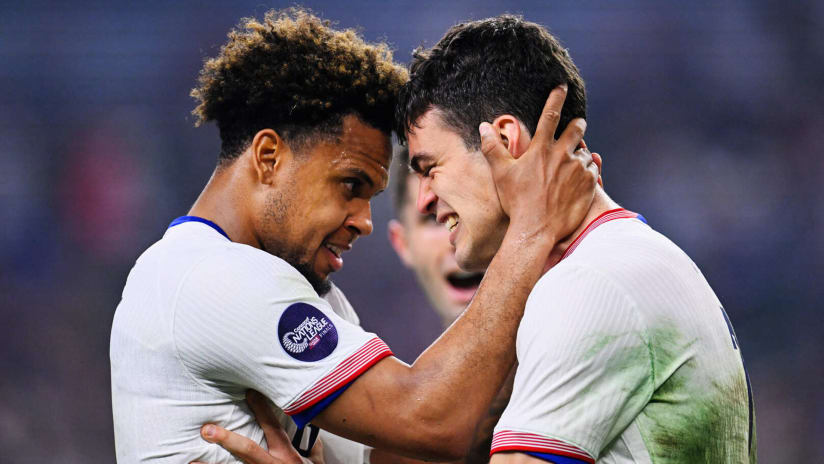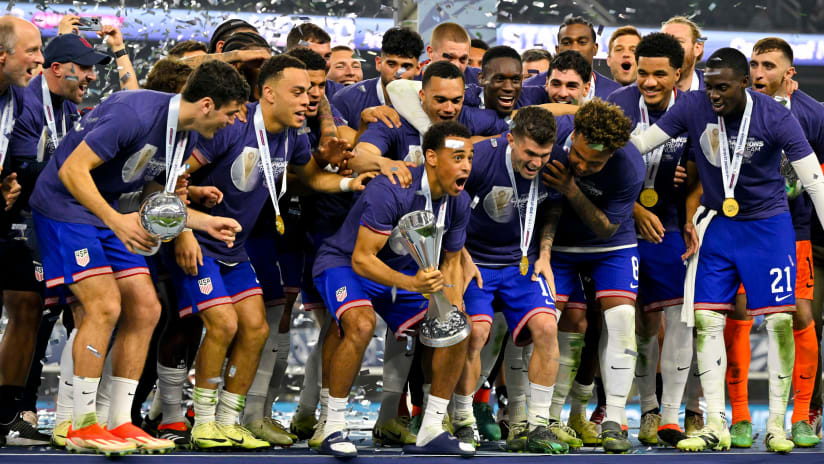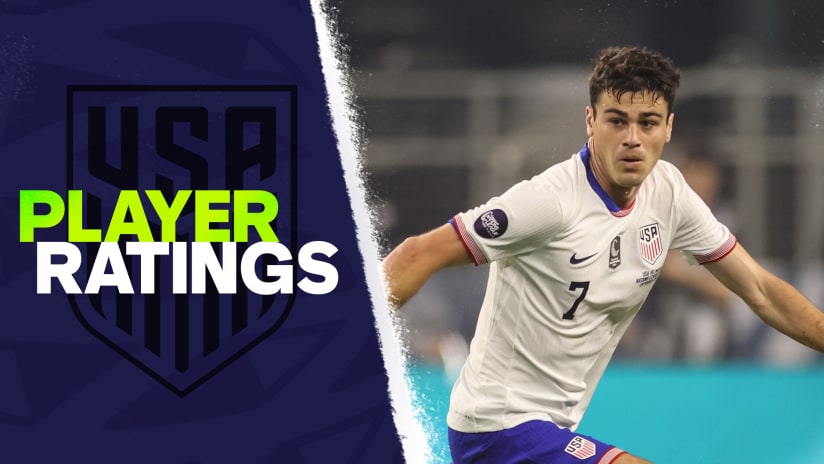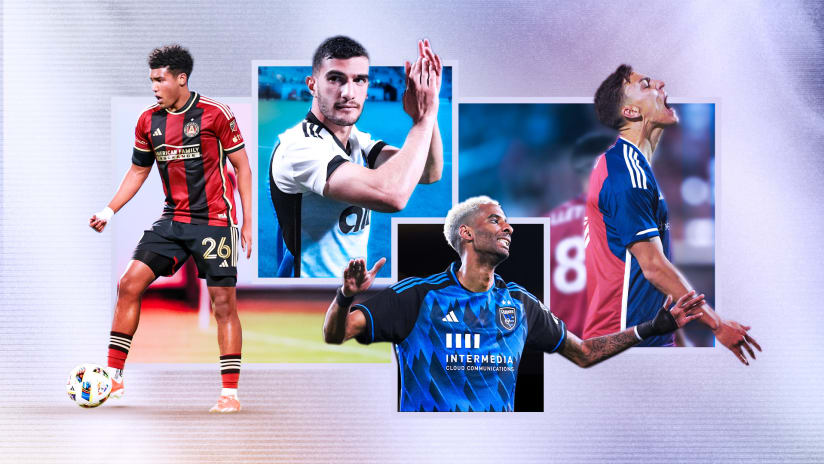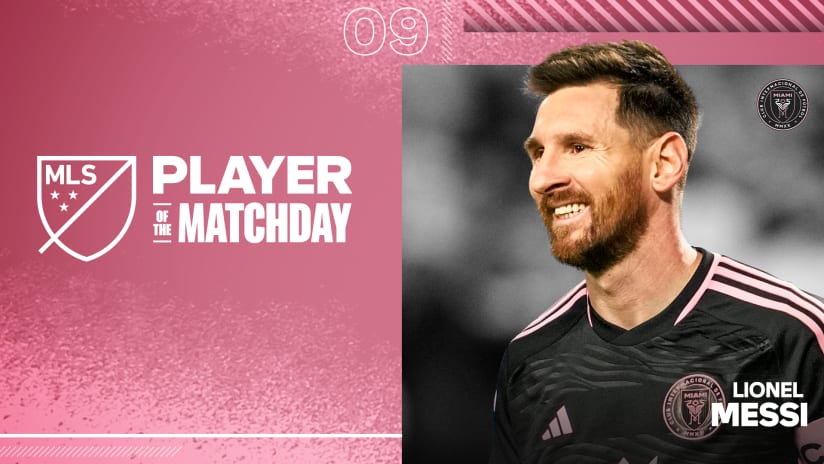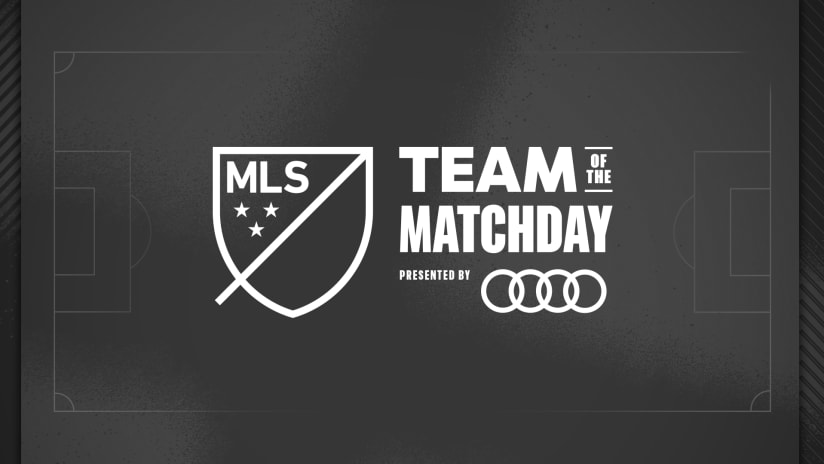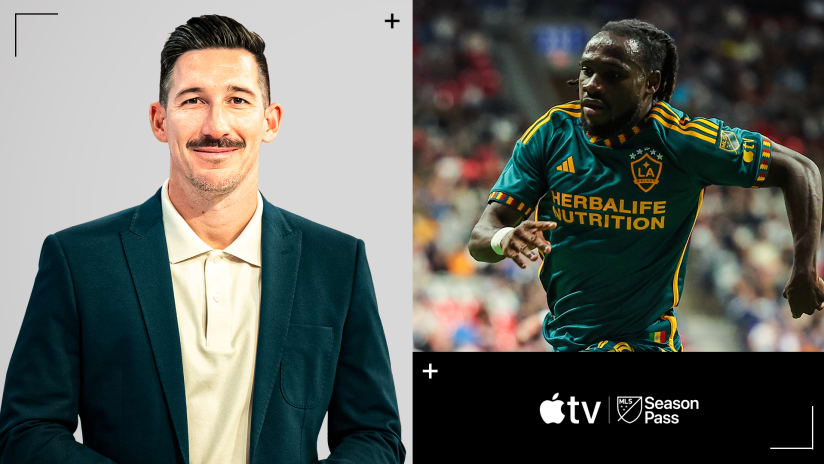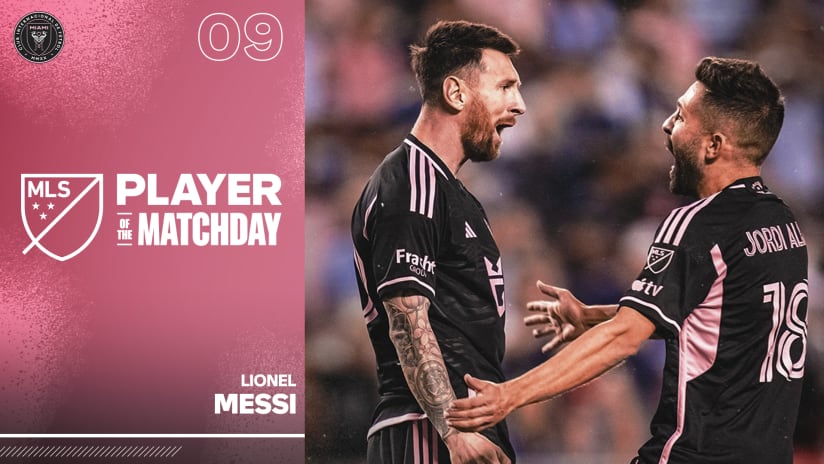Welcome to our bite-sized guide to the World Cup, one that should help fans of all stripes digest just what's going on for the next month.
We picked out 34 big things to know. Let's start with the biggest:
1. The USA has a very rich history in the World Cup.
2014 marks the United States' seventh straight World Cup appearance, something only Brazil, Argentina, Germany, Italy, Spain and South Korea have done. We have advanced to the knockout rounds three of the last five times, and got to the quarterfinals in 2002.
Our World Cup history includes more than a few star players (from left to right above): Joe Gaetjens (1950), John Harkes (1990, 1994), Clint Dempsey (2006, 2010, 2014), Alexi Lalas (1994), and Landon Donovan (2002, 2006, 2010).
2. Go watch the US games at a bar.
Trust us.
3. Yes, the USA could win this World Cup.
Look at that image again. Wouldn't that be nice? Hell, yeah!
Despite what US head coach Jurgen Klinsmann says, yes, the US could win this World Cup. It would be a shock, but the US are no worse than Greece in 2004 or Denmark in 1992, unheralded teams that played the multiple games of their lives and won major championships. So it can happen.
But it won't.
4. One of these four nations will win this World Cup, because, well...
At this point, most experts believe that Brazil, Argentina or Germany will take the crown. And some think Spain might repeat.
5. But there are some dark horses to know as well.
Belgium, Portugal and Colombia are trendy. Don't sleep on Chile or Ghana, either. And never bet against Italy. You should really learn about all 32, though, because there's always one big surprise
6. No, England will not win the World Cup this year.
You'll hear a lot about the English team this summer. Damned if we know why. Maybe because of the default association with the English Premier League, home to many of the best players in the world, none of whom are actually English. Or maybe because of a lingering David Beckham afterglow? Regardless, the English aren't that good and will struggle to get out of Group D, which includes Uruguay, Italy, and Costa Rica and is considered by some to be the Group of Death.
7. The USA are in the real Group of Death.
Group of Death, y'all. Yay! The US will take on Germany, Portugal, and Ghana. Notice, all three were already mentioned. In other words, the Yanks have a lot of work to do over the next couple of weeks.
8. The three best players in the world are in Brazil.
Messi and Ronaldo and Neymar. The first two – Argentina's Lionel Messi and Portugal's Cristiano Ronaldo – have waged a seven-year campaign for the title of "Greatest Footballer on Earth." The third – Brazil's Neymar – could start seriously crashing that party if he leads his nation to the title.
9. A bunch of other really good players are there, too.
If you want to impress the guys next to you at the bar, throw out some of these names: Luis Suarez (Uruguay), Luka Modric (Croatia), Eden Hazard (Belgium), Karim Benzema (France), Edin Dzeko (Bosnia-Herzegovina), and the US's own Michael Bradley. And this is the last ride for Spain's Xavi and Italy's Andrea Pirlo, two midfielders who have defined a generation.
10. British is not a language, but you'll hear a lot of it this summer.
For various reasons, Americans often use British terms when talking about soccer, despite the existence of perfectly good and long-used American words. Oh well. Here's a quick lexicon to help you out:
American |
British |
uniform/jersey |
kit |
field |
pitch |
cleats |
boots |
zero |
nil |
shootout |
penalties |
roster |
squad |
soccer |
football |
11. We call it "soccer" because the British taught us to call it that, by the way.
When the game was brought to America (and Canada!) in the second half of the 19th century by British immigrants, they called it "soccer." No, it's true. Soccer was used as shorthand for "Association Football," which is the official name of the game, and it was used to differentiate it from "rugby," a.k.a. Rugby Football.
"Football" didn't overtake "soccer" as the name of choice in Britain until the 1970s. So next time your oh-so-cultured friend insists upon calling it "football," just tell him: "You know what, mate, Brian Clough called it soccer."
And then laugh as he surreptitiously Googles that name, and later pretends to know all there is to know about Nottingham Forest.
12. Don't tell people to call it "soccer"
Because that's as obnoxious as that oh-so-cultured friend telling you to call it football. By any name – soccer, fútbol, futebol, calcio, ποδοσφαιρο,zùqiù – it's the beautiful game.
13. Speaking of the beautiful game.
That's the literal translation of "jôgo bonito," a Portuguese phrase coined in Brazil (of course) sometime in the 1950s. It refers to soccer played at its most artistic, expressive levels – something only a few teams are really capable of.
14. The basic rules are good to know. For example, the offside rule.
Here's the offside rule explained. An attacking player is offside when closer to the opponent's goal than both the ball and the second-to-last defender – usually the last outfield player – and also in the opponent's half of the pitch at the moment the ball is played to him by a teammate.
Standing "offside" isn't an offense in and of itself, and if the player in the offside position doesn't become actively involved in the play, he will not be whistled. Once he does become involved, the assistant ref's flag will shoot up, play will be halted and the defending team will be awarded an indirect free kick.
15. "An indirect free kick."
The ref stops play, the ball comes to a complete stop, and the team awarded the kick begins play again. The only stipulation is that you can't score a goal directly off the restart – hence, "indirect" free kick.
16. There are also direct free kicks.
They happen all the time. Here's our favorite:
17. There are also throw-ins.
These happen when the ball goes over the sideline, or "touchline," or "into touch." We're betting your England-supporting friend says "into touch."
18. And corner kicks.
These happen when the defending team puts the ball over the endline. Or baseline, if you want to basketball-ize it.
19. Not to mention goal kicks.
Those are for when the attacking team puts the ball over the endline.
20. There are several differences between a goal kick and a free kick.
Goal kicks must be taken from inside the goal area (the smaller square painted on the field where the goalkeeper spends the majority of his time – colloquially called the six-yard box). They have to be kicked – the 'keeper can't pick the ball up and punt it – but they don't have to be taken by the 'keeper.
And here's another tiny thing: You can't be offside on a goal kick, or a corner kick, or a throw-in.
21. OK. Let's go over the offsides rule again. It's complicated.
First, drop the "s" – it's just "offside." Here, this video might help:
22. Penalty kicks are taken from the penalty mark.
That's 12 yards out, dead-center on goal. They're awarded when an attacking player is fouled in the penalty box – that bigger rectangle, often called "the 18-yard box."
23. Not all penalty kicks result in red cards.
Red cards are only given in that situation if they deny an obvious goal-scoring atttempt, or as the result of serious foul play. If you see red, you get ejected from the game ("sent off" is what the announcers will say) and your team has to play 10-vs-11 for the duration – it's not like in basketball where players who foul out can be replaced.
Yellow cards are given for offenses more serious than a regular foul, but less serious than a red. Two yellows equals a red – ejection, suspension and all.
24. In knockout games, penalty kicks could determine the winner.
Here's how you break a tie. If, after the full 90 minutes are played and both teams are tied, you play 30 minutes of extratime. It is not sudden death. If the two teams are still tied after the extratime, you go to a penalty shootout. It's a best-of-five shootout. And it's awesome.
But here's the thing: If you want to sound elitist, turn to the guy next to you at the bar and say: "It's not a penalty shootout, you buffoon. It's kicks from the mark."
25. It's good to know a little bit about formations, including the one the US plays.
They play a 4-4-2 with a diamond midfield. Some people will want to describe it as a 4-3-2-1, some as a 4-2-3-1, but it's a diamond.
Not all diamonds look the same, and no formation looks like what it's called by 100 percent of the time. Soccer is a fluid game, with players swapping positions and roles on the fly. It's not like American football, where each position is pretty highliy delineated.
26. OK, this all got pretty dense all of a sudden. Here's a bracket to fill out:
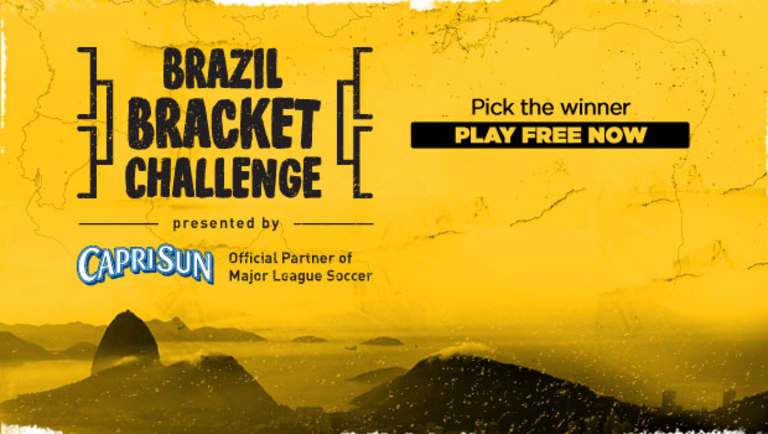
27. The nicknames are awesome.
This World Cup will include all manner of animals (the Elephants of Ivory Coast, the Indomitable Lions of Cameroon, the Fennec Foxes of Algeria, the Three Lions of England, the Super Eagles of Nigeria); fantastical creatures (the Dragons of Bosnia-Herzegovina); colors (gli Azzurri of Italy, les Bleus of France, the Albiceleste of Argentina, the Samurai Blue of Japan); emotions (la Furia Roja of Spain), and geometrical shapes (the Black Stars of Ghana).
28. So are the uniforms.
The first game of the World Cup between Brazil and Croatia will be like watching a flock of canaries take on a bunch of tablecloths. The uniforms are always a sight to behold at the World Cup. Check out this excellent history of World Cup jerseys.
29. The World Cup is all over your TV, in multiple languages.
ABC/ESPN in English and Univision in Spanish have every game covered in the United States. Up in Canada, TSN/CBC has you covered. Check out the full schedule.
30. You're totally into it now and need 24/7 coverage.
Then you need Twitter. Let's start with our guys down on the scene in Brazil:
Nick Firchau and Andrew Wiebe are on the written beat. Albert Lanzillo, who is actually only 12 years old, is our videographer.
There's also KICKTV's faux journalist extraordinaire (and 2006 USMNT World Cup hero) Jimmy Conrad.
ESPN's crew is also on the scene, and 1994 World Cup hero Alexi Lalas is writing a song a day, while partner in crime Taylor Twellman has broken every USMNT-related story for the past year.
You can also find Sports Illustrated's dynamic duo of Grant Wahl and Brian Straus, Goal.com's Ives Galarcep, ESPN.com's Jeff Carlisle and Doug McIntyre, and FoxSoccer.com's Leander Schaerlaekens.
There's also Franco Panizo and Charlie Boehm, two MLSsoccer.com freelancers who are down there. Franco's reporting for Soccer By Ives, while Charlie will be submitting for myriad sites throughout the soccersphere.
Make sure to pay special attention to Franco's feed after hours, and alert his parents if you see anything untoward.
31. Here are some more accounts to follow:
USMNT History, Brazuca, Futbol pictures, and USA Soccer Guy. They are all great follows for very different reasons.
32. Let us explain this:
What's to explain? Clearly the ball never crossed the line!
OK, OK, that image may have been doctored. It's actually from Germany's 4-1 win over England in 2010, when a Frank Lampard shot bounced off the crossbar and over the line, but the goal was not given. The ensuing furor made FIFA (soccer's governing body) finally drag themselves into the 1980s and institute something called "goal-line technology." You'll hear a lot about this. Basically, there's a microchip in the ball that sets off some sort of bloop or beep when it crosses the goal line, thereby taking human error out of the equation. Finally.
33. Here's what happened in 1950:
The last time Brazil hosted the World Cup, in 1950, they should've won the whole thing. But they didn't. They clenched up at the last hurdle, losing the final to Uruguay, 2-1, in a match that was dubbed by the Brazilians as the Maracanazo. To spare you any extra reading about it, here are the Cliff's Notes: They lost a World Cup they were heavily favored to win to a next-door rival in front of 200,000 screaming fans. And they did it home. Yes, it still haunts their soccer psyche.
34. And that could happen again.
If it does, then Brazil burns while new stars, legends and myths are born somewhere else – which is the magic of the whole thing in the first place.

